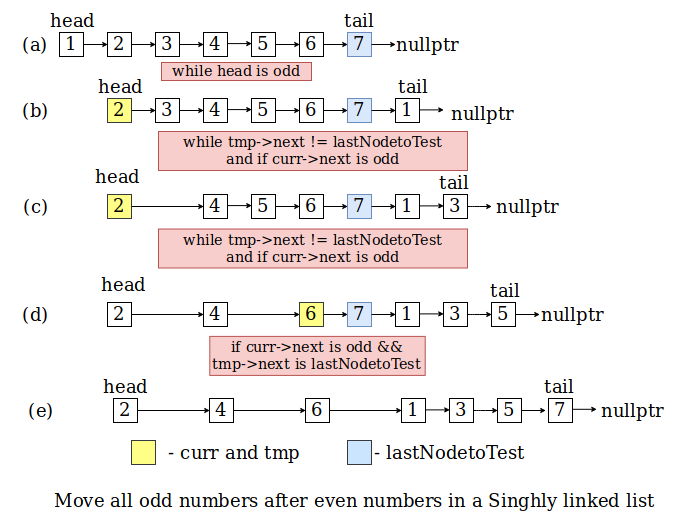Move all Odd numbers after Even numbers in Singly Linked List | C++ Implementation
Given a Singly Linked List, we have to modify it such that all Even numbers appear before Odd numbers.
For eg.
1
2
Given Linked List : 1, 2, 3, 4, 5, 6, 7
After Modification : 2, 4, 6, 1, 3, 5, 7

From the above fig. we can see that how the function will work.
While the head of the list is odd, the head is copied to an auxiliary node and element next to the head will become new head. The auxiliary node is added after tail and tail is updated. Similarly all odd value nodes are removed from their position and added after the tail of the list.
Here is the advance, getLastNode, isOdd and exchangeEvenOdd function.
1
2
3
4
5
static void advance(Node*& node)
{
assert (node != nullptr);
node = node->next;
}
Using this function node advances to next node.
1
2
3
4
5
6
7
8
Node* getLastNode()
{
Node *node = head;
while (node->next != nullptr)
node = node->next;
return node;
}
This function returns the last node of the linked list.
1
2
3
4
5
6
7
bool isOdd(int num)
{
if (num % 2 != 0)
return true;
else
return false;
}
This function checks whether the entered value is odd or even.
1
2
3
4
5
6
7
8
9
10
11
12
13
14
15
16
17
18
19
20
21
22
23
24
25
26
27
28
29
30
31
32
33
34
35
36
37
38
39
40
41
42
43
44
45
void exchangeEvenOdd()
{
Node *node = nullptr;
Node *lastNodeToTest = getLastNode();
Node *tail = lastNodeToTest;
while (isOdd(head->data) == true)
{
node = head;
advance(head);
tail->next = node;
advance(tail);
}
Node *tmp = head;
Node *curr = head;
while (tmp->next != lastNodeToTest)
{
if (isOdd(curr->next->data) == true)
{
node = curr->next;
curr->next = node->next;
tail->next = node;
advance(tail);
}
else
{
//advance "curr" and "tmp" only when next node to it is even
advance(curr);
advance(tmp);
}
}
if (isOdd(curr->next->data) == true && tmp->next == lastNodeToTest)
{
node = lastNodeToTest;
curr->next = lastNodeToTest->next;
tail->next = lastNodeToTest;
advance(tail);
}
tail->next = nullptr;
lastNodeToTest = nullptr;
node = nullptr;
}
C++ Implementation
1
2
3
4
5
6
7
8
9
10
11
12
13
14
15
16
17
18
19
20
21
22
23
24
25
26
27
28
29
30
31
32
33
34
35
36
37
38
39
40
41
42
43
44
45
46
47
48
49
50
51
52
53
54
55
56
57
58
59
60
61
62
63
64
65
66
67
68
69
70
71
72
73
74
75
76
77
78
79
80
81
82
83
84
85
86
87
88
89
90
91
92
93
94
95
96
97
98
99
100
101
102
103
104
105
106
107
108
109
110
111
112
113
114
115
116
117
118
119
120
121
122
123
124
125
126
127
128
129
130
131
132
133
134
135
136
137
138
139
140
141
142
143
144
145
146
147
148
149
150
151
152
153
154
#include <iostream>
#include <utility>
#include <cassert>
class LinkedList
{
struct Node
{
int data;
Node * next = nullptr;
Node(int value) : data(std::move(value)), next(nullptr) {}
};
Node *head;
public:
LinkedList() : head(nullptr) {}
~LinkedList()
{
Node *tmp = nullptr;
while (head)
{
tmp = head;
head = head->next;
delete tmp;
}
head = nullptr;
}
void insert(int);
void exchangeEvenOdd();
void printList() const;
private:
static void advance(Node*& node)
{
assert (node != nullptr);
node = node->next;
}
Node* getLastNode()
{
Node *node = head;
while (node->next != nullptr)
node = node->next;
return node;
}
bool isOdd(int num)
{
if (num % 2 != 0)
return true;
else
return false;
}
};
void LinkedList::insert(int value)
{
Node *node = new Node(std::move(value));
Node *tmp = head;
if (tmp == nullptr)
{
head = node;
}
else
{
tmp = getLastNode();
tmp->next = node;
}
}
void LinkedList::exchangeEvenOdd()
{
Node *node = nullptr;
Node *lastNodeToTest = getLastNode();
Node *tail = lastNodeToTest;
while (isOdd(head->data) == true)
{
node = head;
advance(head);
tail->next = node;
advance(tail);
}
Node *tmp = head;
Node *curr = head;
while (tmp->next != lastNodeToTest)
{
if (isOdd(curr->next->data) == true)
{
node = curr->next;
curr->next = node->next;
tail->next = node;
advance(tail);
}
else
{
//advance "curr" and "tmp" only when next node to it is even
advance(curr);
advance(tmp);
}
}
if (isOdd(curr->next->data) == true && tmp->next == lastNodeToTest)
{
node = lastNodeToTest;
curr->next = lastNodeToTest->next;
tail->next = lastNodeToTest;
advance(tail);
}
tail->next = nullptr;
lastNodeToTest = nullptr;
node = nullptr;
}
void LinkedList::printList() const
{
if (head == nullptr)
{
std::cout << "Empty List \n";
return;
}
Node *node = head;
while (node != nullptr)
{
std::cout << node->data << " ";
advance(node);
}
std::cout << "\n";
}
int main()
{
LinkedList ll1;
ll1.insert(1);
ll1.insert(2);
ll1.insert(3);
ll1.insert(4);
ll1.insert(5);
ll1.insert(6);
ll1.insert(7);
std::cout << "Original List : ";
ll1.printList();
ll1.exchangeEvenOdd();
std::cout << "New List : ";
ll1.printList();
}
View this code on Github
Get this post in pdf - Move Odd numbers after Even numbers in Linked List
Reference:
Introduction to Algorithms
The Algorithm Design Manual
Data Structures and Algorithms Made Easy
You may also like
Merge two sorted Linked List (in-place)
Split Singly Circular Linked List
Doubly Circular Linked List
Reverse the Linked List
Finding Length of Loop in Linked List
Doubly Linked List
Singly Linked List